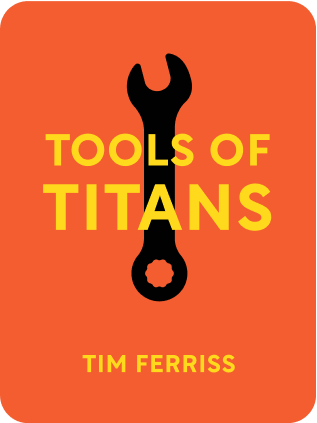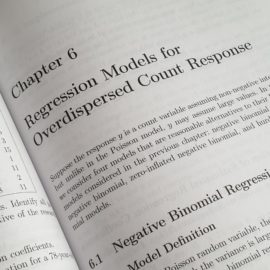

This article is an excerpt from the Shortform book guide to "Tools of Titans" by Timothy Ferriss. Shortform has the world's best summaries and analyses of books you should be reading.
Like this article? Sign up for a free trial here .
Is Tim Ferriss’s book Tools of Titans about? What do you think highly successful people—those who are at the top of their game—do differently?
In Tools of Titans, Tim Ferriss shares the habits and beliefs of 101 high-performing people, including tech investors, entrepreneurs, athletes, and entertainers. The premise of the book is that if you emulate the habits and beliefs of people who succeed the way you want to succeed, you too can be successful.
In this brief overview of Tools of Titans, we’ve pulled out the main themes across all the people Ferriss interviewed.
Tools of Titans: The Tactics, Routines, and Habits of Billionaires, Icons, and World-Class Performers
In his epic 707-page Tools of Titans, Tim Ferriss shares the habits and beliefs of 101 people at the top of their game, including tech investors like Chris Sacca and Peter Thiel, entrepreneurs like LinkedIn’s Reid Hoffman and Evernote’s Phil Libin, superhuman athletes like Amelia Boone and Wim Hof, media figures like Edward Norton and Whitney Cummings, and more.
These are the principles that successful people use to achieve audacious goals, improve themselves, and be happier. The premise: if you can apply the lessons from this book, you can be more effective.
While the book is organized into 140 short chapters, each devoted to one person, here we’ve pulled out the main themes across all the people. This lets you see the patterns of what the titans do—how they define life goals, how they think of good ideas, and how they try to be happier every day.
Inspiration and Goals
Many titans visualize their long-term goals, so it becomes easier to know what they’re fighting for. Arnold Schwarzenegger believes that having a clear vision of the final goal makes the work in between easier. It helps you stomach all the hard work and pain it takes to reach your goal, since you know why you’re pushing so hard.
Be Courageous. Be Brazen
Do you have a big goal you would love to tackle, but you don’t feel ready? You’ve likely put artificial constraints on yourself. Many titans spoke about pushing past artificial boundaries placed on them by society or by themselves.
Realize that every titan you admire started out where you are today—with formidable obstacles towering in front of you. The difference with the titans is they had the courage to push past these obstacles.
- Steve Jobs: “Everything around you that you call ‘life’ was made up by people that were no smarter than you. And you can change it, you can influence it, you can build your own things that other people can use.”
- Dan Carlin: “Don’t be afraid to do something you’re not qualified to do.”
- Author Brene Brown dares herself to choose courage over comfort.
Tim Ferriss’s Fear Exercise
If you ever feel afraid of doing something, try Tim Ferriss’s fear exercise. First, think about the change you want to make.
- If you made the change you’re afraid of, what is the absolute worst that could happen? Picture the situation in vividly clear detail.
- How bad would this outcome be? How permanent would this damage be?
- If this happened, how could you work your way back and recover?
- How likely is this absolute worst case outcome, from 0% to 100%?
- Now that you’ve pictured the worst case outcome, what’s the best case outcome? What’s a realistic good outcome? How would your life be better here?
After this exercise, you likely realize that the worst case is nowhere near permanently crippling. Even if you fail, you’ll be able to recover your old life just fine.
Work Habits and Career
Once you’ve identified your goals, you need to put in the work to reach them. Here are strategies to be more productive and make more progress in the limited time you have.
You Need to Focus
Does life feel busy to you? It doesn’t have to. If you feel like you’re spinning your wheels and moving really fast, but not making any progress in life, you probably have to focus your goals.
The titans in this book have hundreds-fold more opportunities than the typical person, but they don’t have any more time. This means they need to apply a laser-sharp focus to the opportunities that will fulfill their goals.
- From music producer Kaskade: Imagine you have a glass jar, and next to it big rocks, pebbles, and sand. If you put the sand and pebbles in first, they take up all the space, and you can’t fit the big rocks in. But if you add the big rocks, then the pebbles, then the sand, everything fits. Likewise, if you focus on the minor to-do items, you won’t be able to fit the big priorities in.
- Author Derek Sivers has a rule for evaluating opportunities: “If it’s not a ‘hell, yes!’ it’s a ‘no.” If an opportunity doesn’t immediately excite him, it’s probably not that helpful to his goals, and so it’s not worth his time.
- Avoid a “culture of cortisol.” There’s so much emphasis on being busy and fear of missing out that you can go day to day perpetually anxious. There really shouldn’t be many emergencies in your life. Focus on your big goals, and cut out the 20% of things that cause 80% of your unhappiness.
Deciding What to Work On
In a world of endless options, it can be hard to decide what to focus on and build your career around. Here’s some advice.
Become a double/triple threat. Many people try to become the very best in the world at one specific thing, the equivalent of playing basketball well enough to make the NBA. But this is very competitive and has a low probability of success. Instead, you can easily become above average at two or more things, then combine them to great effect.
- Entrepreneur and investor Marc Andreessen agrees, citing these 5 skills as useful to augment any career: communication, management, sales, finance, and internationalization.
Work in an area where you’re not easily replaceable. This is where you can make a unique impact.
- While Tim Ferriss was building his following around self-improvement, he contemplated becoming a full-time venture capitalist (VC). Investor Kamal Ravikant nudged him away, saying that he’d be just like any other VC, and if a company didn’t get his investment, they’d just find another investor. In contrast, Tim’s listeners wrote to him with dramatic stories of personal transformation, and he’d never have that impact as a VC.
Personal Habits
The people profiled in the book tend to be exceptionally disciplined and goal-oriented. Here are themes of advice on personal habits.
Action, Not Information
Are you obsessed with learning new tactics, but have a problem following through?
Realize that success doesn’t come from knowledge, it comes from action.
- Author Derek Sivers: “If [more] information was the answer, then we’d all be billionaires with perfect abs.”
- Author and speaker Tony Robbins: An infographic doesn’t make you a master. What matters isn’t what you know—it’s what you do, consistently.
- Artist Chuck Close: Don’t feel you need to have that perfect idea before you start doing. Most likely you’re just holding yourself back. Only amateurs rely on inspiration—experts just get to work. While working, you’ll find new opportunities that wouldn’t be obvious if you just sat there thinking.
- Entrepreneur and investor Naval Ravikant: Free information is everywhere on the Internet. What’s scarce is the desire to learn it.
Start a Habit With a Tiny Push
Want to lose 50 pounds, or meditate for half an hour daily, or read a book a week forever? These are big goals—maybe too big. If you chew off too much at the start, you might falter and feel self-defeated.
Instead, try just one small action. No one ever has too little time or energy for one tiny action. Having one successful small action builds momentum to adopting your habit.
- WordPress founder Matt Mullenweg: to get in shape, he committed himself to one push-up before bed.
- Former Google employee and author of Search Inside Yourself, Meng Tan suggests taking just one mindful breath a day.
- Music producer Rick Rubin: Artists who struggle to produce should just write a single word. Could they summon the energy to write just one word?
Improving Your Weaknesses
Much of personal development is about identifying your weaknesses, then improving them with deliberate action.
Finding your weak spots can be difficult—by its nature, if you’re not good at something, it’s often hard to realize that you’re not good at it. Step outside yourself.
- If someone else came to you with your exact problem, you’d likely be able to fix that problem. But you aren’t able to see that problem in yourself.
- Think of yourself 10 years from now. What would that person tell you?
- Imagine your best advisors in your head giving you advice. Goethe wrote a book by locking himself in a hotel room and imagining his 5 best friends on different chairs.
Once you find your weak spots, get the motivation to fix them. Often, people evade their weaknesses by making excuses: it wasn’t all that bad in the past, or it’ll get better in the future. To confront this, answer these questions about your weaknesses:
- Think about the limiting beliefs you have that are handicapping you.
- What has the belief cost you in the past? What has it cost other people you care about in the past? Visualize this and feel it viscerally. Hear the sounds, see the sights, feel the emotions.
- What will the belief cost you and people you care about in the future? Imagine what happens 1 year from now, 5 years from now, and 10 years from now. Hear the sounds, see the sights, feel the emotions.
Going through this exercise forces you to confront the real costs of your bad behavior.
Creativity and Ideas
No matter what field of work you’re in, you’d likely benefit from being more creative and generating more good ideas. Here’s advice on how to generate more good ideas, how to identify the best ones, and how to put them to action.
Generate a Lot of Bad Ideas to Get Good Ideas
Do you struggle to find that one perfect idea, and hold yourself back from entertaining less-than-perfect ideas?
Your bar is set too high. Spend your energy coming up with LOTS of ideas, even if they’re silly. What matters isn’t your hit rate, but rather the number of good ideas you have at the end.
- Author James Altucher challenges himself to come up with 10 ideas a day. These aren’t necessarily business ideas, but also around themes like “10 ways I can save time,” “10 ridiculous inventions,” or “10 ways to solve a problem I have.”
- Author Malcolm Gladwell comes up with as many ideas as possible, scrutinizes them, and kills them off. The unkillable ideas are worth going forward with.
- Many writers don’t believe that writer’s block exists. Author Paulo Coelho (The Alchemist) says that even if he doesn’t feel inspired, he enforces the discipline of writing his way out.
How to Think of Ideas
Ask the dumb questions. These get you to look at situations in a new way.
- Founder of Gimlet Media Alex Blumberg: Important stories often have a very basic question no one’s asking. Like leading up to the 2008 Great Recession, “why are banks loaning money to people who can’t pay it back?”
Put yourself into an environment that gives you maximum exposure to new ideas, problems, and people.
Question conventional wisdom and think of “dumb ideas.” If what you’re working on sounds reasonable to most people, you may not be thinking creatively or innovatively enough.
- Futurist Jim Dator: “Any useful statement about the future should at first seem ridiculous.”
- Futurist Alvin Toffler: “It’s far more important to be imaginative than to be right.”
- Entrepreneur and investor Marc Andreessen: To do innovative work, you don’t have to know a secret no one else knows. You do have to believe something few other people believe.
Testing Ideas
Once you have a lot of ideas, how do you find the good ones?
Often, you’re not the best judge of your own ideas. By yourself, you’re unlikely to find the very best solution or see the entire picture. You need other people to stress-test your ideas. If an idea survives the trial by fire, then it’s a good idea. If it doesn’t, you’ve just saved yourself a lot of time.
- Investor Marc Andreessen develops his ideas with his co-founder Ben Horowitz. Whenever each person brings in a deal, they just “beat the shit out of it.” Even if the idea is good, they force themselves to rip the idea apart. Then, at the end, if they still feel it’s a good idea, it’s survived the torture test.
- LinkedIn founder Reid Hoffman tests the mettle of his staff by whether they push back on the strategy given them. Instead of just taking it fully as is, the best people suggest improvements to the plan based on their expertise.
- To challenge their plans, the military creates “red teams” of people whose mission is to sabotage the plan.
Business Strategies
Many of the titans interviewed are entrepreneurs of some kind—often by building businesses, or by being self-employed as authors, entertainers, or media creators. These are the titans’ tips for how to start a successful business and grow it.
1,000 True Fans
To be successful, you don’t need to be a global superstar or have millions of followers. Instead, you need just 1,000 true fans (a concept popularized by Wired founding executive editor Kevin Kelly). A true fan is defined as “a fan who will buy anything you produce.” True fans become your direct source of income and the major marketing force for ordinary fans.
If you can get true fans, then you’re sure that you’re solving problems for a real group of people. Produce work to excite your 1,000 true fans, not to get a lukewarm reception from 100,000 people.
Be Authentic
Many titans, especially those in entertainment, praised authenticity. People crave realness and connection, and being yourself will find the audience that likes you for you. Don’t be afraid to differ from common sense or society’s expectations to be yourself.
- Comedian Whitney Cummings found her greatest comedic success in revealing her embarrassing moments, which allowed her audience to connect and feel a catharsis.
- TV host Glenn Beck: Early in his radio show, a caller accused Glenn Beck of being Mr. Perfect. For 15 minutes, Beck shared his biggest mistakes and his past as an alcoholic. He first thought his career was over, but he then realized people are starving for something authentic.
Business Tactics
Don’t think 10% bigger, think 10 times bigger. When you go 10 times bigger, you have to start with a new approach. You’re by yourself in a new space, not competing with everyone else who’s also trying to get 10%.
Don’t head for a hyper-competitive area. Competition is hard and sucks the profit out of companies.
Failure is not good. While this might sound obvious, accepting failure has become a common mindset in tech startups. In contrast, failure is actually painful and should be avoided.
- Founder and investor Marc Andreessen feels that pivoting from a company that isn’t working is too easy of an option and overvalued. Instead, put the time into figuring it out and getting it right.
Charge for what you’re selling. The conventional wisdom in startups is to price your product low, or even free, to get mass penetration and volume. However, this causes problems with being unable to fund sales and marketing to rev up the growth engine. People paying for your product is proof that it’s good; if your product is free, you don’t know how much you can later charge for it.
Execute quickly. Peter Thiel asks, “If you have a 10-year plan, why can’t you do this in 6 months?”
Happiness and Mindset
Being productive and reaching your goals obviously aren’t the only important things in life. Being happy and in control of your emotions is another form of success important to titans.
Be Grateful for Things
Far from being the cutthroat, take-no-prisoners stereotype of success, the titans tended to reflect on their lives and be thankful for where they are.
- Tony Robbins believes gratitude prevents you from feeling anger or fear. He starts off his morning by meditating on what he’s grateful for.
- Tim Ferriss recommends naming 3 new things you’re grateful for in an end-of-day 5-minute journal. Instead of repeating the same things like your health, consider small things, like an old relationship that really helped you, something great that you saw happen, or something simple that you can see.
- Author Seth Godin: Why fixate on all the times someone betrayed or rejected you? It makes more sense to keep track of all the times it worked, all the times you took a risk and it worked out. You can control your own narrative.
Dealing With Negative Emotions
Anxiety:
- Tim Ferriss poses a question in many of his interviews: “What would you tell your younger self?” The most common response was “relax, don’t get anxious—everything will work out.”
- For anything in life, you have three options: change it, accept it, or leave it. It’s not good to want one option but not act on it—like wishing you would change it but not doing anything to change it, or wishing you would leave it but not leaving it.
Stress:
- Navy SEALs have a saying about leadership: “Calm is contagious.” People mimic your behavior. If you stay calm, they’ll be calm too. If you panic, they’ll panic too.
- In his response to crises, Matt Mullenweg exemplifies “getting upset won’t help things.”
- A titan told a story about meeting boxer Evander Holyfield before one of his big fights. The titan was worried that he was imposing on his pre-fight prep, but Holyfield waved it off. He knew he had done everything he could before the fight to be ready for the fight, and the minutes before a fight wouldn’t change anything.
Anger:
- A Buddhist saying: “Holding onto anger is like holding a hot coal while waiting to throw it at someone else.”
- When feeling anger, don’t suppress it or swat it away. Acknowledge it explicitly. This helps to dissolve the issue.
Cynicism:
- Media host Jason Silva notes that being cynical or jaded is like being dead. Nothing impresses you, you feel like you’ve seen everything before, and you see the world through dark lenses.

———End of Preview———
Like what you just read? Read the rest of the world's best book summary and analysis of Timothy Ferriss's "Tools of Titans" at Shortform .
Here's what you'll find in our full Tools of Titans summary :
- The habits and beliefs of 101 people at the top of their game
- Tim Ferriss' list of 17 questions you should ask yourself to challenge your thinking
- How emulating the habits of successful people you look up to can make you successful as well






